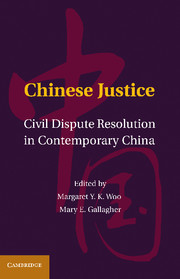Book contents
- Frontmatter
- Contents
- Tables and Figures
- Contributors
- Acknowledgments
- Abbreviations
- Glossary
- Introduction
- PART I LEGAL DEVELOPMENT AND INSTITUTIONAL TENSIONS
- PART II PU FA AND THE DISSEMINATION OF LAW IN THE CHINESE CONTEXT
- 5 The Impact of Nationalist and Maoist Legacies on Popular Trust in Legal Institutions
- 6 Public Attitudes toward Official Justice in Beijing and Rural China
- 7 Users and Non-Users: Legal Experience and Its Effect on Legal Consciousness
- 8 With or without the Law: The Changing Meaning of Ordinary Legal Work in China, 1979–2003
- PART III LAW FROM THE BOTTOM UP
- Conclusion: Chinese Justice from the Bottom Up
- Index
- References
8 - With or without the Law: The Changing Meaning of Ordinary Legal Work in China, 1979–2003
Published online by Cambridge University Press: 05 July 2011
- Frontmatter
- Contents
- Tables and Figures
- Contributors
- Acknowledgments
- Abbreviations
- Glossary
- Introduction
- PART I LEGAL DEVELOPMENT AND INSTITUTIONAL TENSIONS
- PART II PU FA AND THE DISSEMINATION OF LAW IN THE CHINESE CONTEXT
- 5 The Impact of Nationalist and Maoist Legacies on Popular Trust in Legal Institutions
- 6 Public Attitudes toward Official Justice in Beijing and Rural China
- 7 Users and Non-Users: Legal Experience and Its Effect on Legal Consciousness
- 8 With or without the Law: The Changing Meaning of Ordinary Legal Work in China, 1979–2003
- PART III LAW FROM THE BOTTOM UP
- Conclusion: Chinese Justice from the Bottom Up
- Index
- References
Summary
Until 1979, China had never been a country with a highly differentiated legal system. From the Law Classics (Fa jing) in the Warring State period (480–221 b.c.) to the Great Qing Criminal Code (Da Qing lü li, effective during 1740–1910), the two-millennium history of codification in imperial China had always been characterized by a strong emphasis on criminal law; most noncriminal disputes were adjudicated according to the Confucian ethics (li) and social customs, without referring to any legal code. Meanwhile, in the Chinese political system there was no separate judiciary from the government, and the local magistrate was both the administrative leader and the judge for crimes and social disputes. Accordingly, no formal legal profession was found in imperial China. In certain periods, there were “litigation masters” (song shi) who provided help to the people in litigation, but they were neither organized into a legal profession in the Western sense nor recognized by the state. Ordinary social order largely was maintained in a harmonious and unified way through non-legal means. However, in the twentieth century, this social order was almost completely broken down because of the incessant revolutions, culminating in the Cultural Revolution during 1966–76.
Since the late 1970s, the Chinese legal system has experienced a series of fundamental changes. Tens of thousands of laws, regulations, judicial interpretations, ministry regulations, and local regulations have been promulgated, starting with the Criminal Law and Criminal Procedure Law in 1979.
- Type
- Chapter
- Information
- Chinese JusticeCivil Dispute Resolution in Contemporary China, pp. 234 - 266Publisher: Cambridge University PressPrint publication year: 2011
References
- 5
- Cited by



